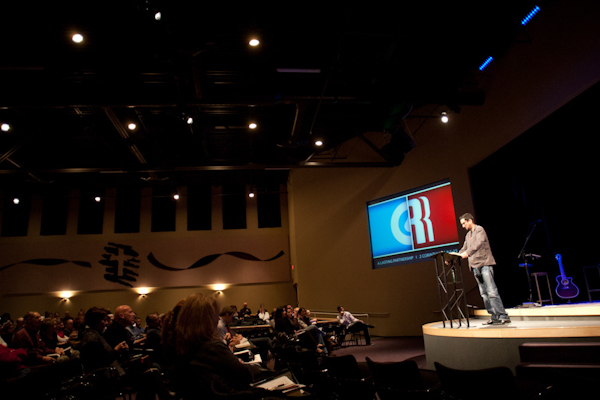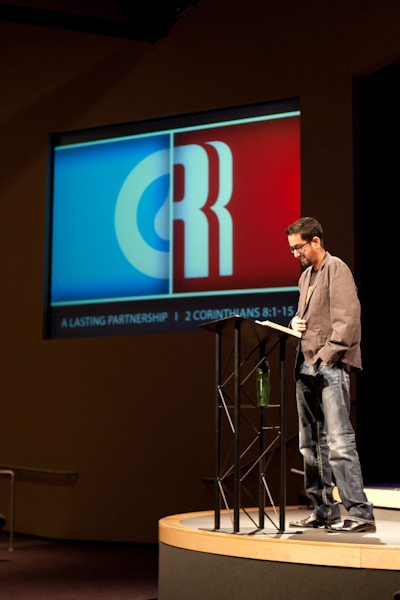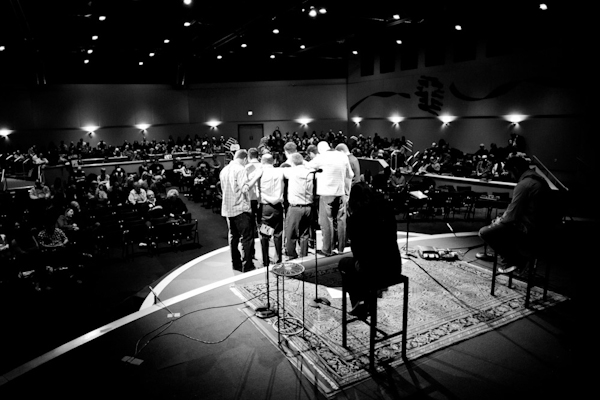Archive for the Sermon Follow-Up Category
Mar 22
Resources for Depression and Spiritual Desertion
Earlier this week we published a blog in follow up to Ryan’s sermon, “Why Are You Downcast? Unpacking Depression.” That post included a number of Scriptures, quotes, and reflections on the subject of depression and spiritual desertion specifically.
In this post we’re including links to a number of the more helpful books and articles on the subject of depression and spiritual desertion. Of course, a great first-stop in exploring this matter is Ryan’s three-session Saturday Seminar on Depression conducted several years ago here at DSC. The third session was about spiritual desertion specifically.
Resources about Depression in General
- Blame It on the Brain?: Distinguishing Chemical Imbalances, Brain Disorders, and Disobedience, Ed Welch
- The Bruised Reed, Richard Sibbes
- Spiritual Depression: Its Causes and Cure, Martin Lloyd-Jones
- Deserted by God?, Sinclair Ferguson
- When I Don’t Desire God: How to Fight For Joy, John Piper
- Depression: Looking Up from the Stubborn Darkness, Ed Welch
- “Spiritual Depression in the Psalms,” John Piper
- “Depression, Gratitude and Charles Haddon Spurgeon,” Randy Alcorn
- “The Minister’s Fainting Fits,” Charles Haddon Spurgeon
- “Spiritual Depression” (Part 1, Part 2, Part 3, Part 4), Thabiti Anyabwile
- “Lessons from an Inconsolable Soul: Learning from the Mind and Heart of C. S. Lewis,” John Piper
- “Charles Spurgeon: Preaching Through Adversity,” John Piper
- “Insanity and Spiritual Songs in the Soul of a Saint: Reflections on the Life of William Cowper,” John Piper
Resources about Spiritual Desertion
- The Case and Cure of a Deserted Soul: Or a Treatise Concerning the Nature, Kinds, Degrees, Symptoms, Causes, Cures Of, and Mistakes About Spiritual Desertions, Joseph Symonds
- “The Puritain in Private,” in The Genius of Puritanism, Peter Lewis
- A Lifting Up for the Downcast, William Bridge
- Spiritual Desertion, Gisbertus Voetius
- The Dejected Soul’s Cure, Christopher Love
- The Soul’s Conflict With Itself and Victory Over Itself by Faith, in The Works of Richard Sibbes, Vol 1
- Discouragement’s Recovery, in The Works of Richard Sibbes, Vol 7
- A Child of Light Walling in Darkness, in The Works of Thomas Goodwin, Vol 3
- “Desertion: Does God Ever Desert His People?,” C. Matthew McMahon
- “Puritans Living in Relationship to Affliction, Desertion, and Sin,” Joel R. Beeke
Mar 21
“Why Are You Downcast, O My Soul?” Unpacking Depression
This past Sunday Ryan preached his second sermon from Psalms 42-43. Since this particular sermon was on such an important topic, and since there were numerous Scriptures, lists, and quotes worth keeping on hand, this post will collect those for you as you deal with and help others deal with depression.
In his sermon from March 4, “How to Really Talk to Yourself,” Ryan expounded on that important discipline of passionately, persistently preaching truth to ourselves, especially in the midst of trial, testing, doubt, or even despair.  In this Sunday’s sermon, “Unpacking Depression: Why Are You Downcast?“, Ryan focused on the specific problems in Psalms 42-43: dryness, doubt, depression, or even despair. When the psalmist asks of his soul, “Why are you downcast?,” from one angle, he seems to do so rhetorically. In that sense, he has no right to be downcast! But the question can also be seen as a legitimate inquiry, a question that needs answering. And that was the aim of Ryan’s most recent message — to attempt to answer the Psalmist’s question…or at least provide some possible answers to depression’s cry of “Why?”
Depression is a stubborn and complicated thing, mingling body and soul in a knot of unrelenting and often irrational sadness. It is remarkably inconsolable.
Charles Spurgeon wrote of this: “There are dungeons beneath the castles of despair.†On another occasion he explained, “Causeless depression cannot be reasoned with, nor can David’s harp [the Psalms] charm it away by sweet discoursings. [You might as] well fight with the mist as with this shapeless, undefinable, yet all-beclouding hopelessness. . . . The iron bolt which so mysteriously fastens the door of hope and holds our spirits in gloomy prison, needs a heavenly hand to push it back.â€
Richard Baxter, a 17th century pastor, described well the senselessness of what he called “melancholy.”
- It overthrows the sober and sound use of reason; a man’s judgment is corrupted and perverted by it.
- It disables a man to govern his thoughts.
- It swallows up faith itself, and greatly hinders its exercise.It hinders hope; they think that God’s promises are true to others, yet cannot they hope for the promised blessings to themselves.
- It swallows up all comfortable sense of the God’s goodness and love of God.
- It is a false and harmful judge of all the word and works of God.
- It greatly advantages Satan to cast in blasphemous thoughts of God.
- It makes men unfit for all profitable meditation; it confounds their thoughts, and turn them to hurtful distractions and temptations.
- It makes all sufferings more heavy.
Ryan’s sermon unfolded with three main sections. Frist, he answered the psalmist’s question, why are you downcast, O my soul?, with ten possible answers. Second, focusing on that tenth possible reason for depression, Ryan answered the question, has God withdrawn from me? Third, his sermon ended gave some practical suggestions to the question, what shall I do?
Question 1: Why are you downcast, O my soul?
- Perhaps, under the circumstances, it’s an appropriate response. In Psalms 42-43 there are understandable reasons expressed for being troubled. Sometimes distress is a fitting response to distressing circumstances.
- Perhaps there are physical, practical dynamics. The psalmist wasn’t eating or sleeping (42:3). There’s a place for evaluating our diet, our sleep habits, our busyness, temperament, and even lack of sunlight. As Spurgeon wrote: “He who forgets the humming of the bees, the cooing of the pigeons in the forest, the song of birds in the woods, the rippling of rills among the rushes, and the sighing of the wind among the pines, needs not wonder if his heart forgets to sing and his soul grows heavy.â€
- Are there unwarranted and unfulfilled expectations? Proverbs 33:12 says, “hope deferred makes the heart sick.” Maybe we’re trusting in this world for our happiness. Depression is a clear window into what we trust and worship. We do better to look through the window of depression at our hearts rather than simply stare at our depression.
- Are persistent sin and unrepentance involved? In this case, being miserable is a good sign. It may be the misery brought about my sin, or the discipline of the Lord.
- Has there been a neglect of the “means of graceâ€? Are we neglecting the tools necessary to “grow in the grace and knowledge of our Lord and Savior Jesus Christ”, such as Bible, prayer, church, and fellowship?” (2 Peter 3:18). Psalms 42-43 speak to the need for corporate worship.
- Have you forgotten that the kingdom is “now and not yet� (See 2 Corinthians 4:7-10; 2 Corinthians 5; Romans 8).
- Are you giving into doubts? Perhaps you are listening and not preaching to yourself. Push against your doubts, don’t give into them.
- Maybe there’s no good reason, and you need to own that.
- Not unrelated to the above, perhaps it is biochemical. There’s a complex relationship between the body and the soul. For this reason, we should have a chastened approach to the place of medicine in addressing our turmoil. We should not think that emotional/spiritual things have nothing to do with our our brain chemistry, for example. Still, we should never think that the sole answer is medicine, or that medicine is always necessary. If you taking anti-depressants, this must not be the totality of your fight. If you are considering taking anti-depressants, consider that there may be other causes for your trouble. Consider practical/physical dynamics, including diet, exercise, rest, work, and temperament. Consider spiritual dynamics, such as sin, spiritual habits, repentance, and trust in God. In his book Blame it on the Brain, Ed Welch writes about such a chastened approach, “Compassion cannot ignore unbelief or sin. Too often, family and friends think the depressed person is very fragile and cannot handle any frank discussion about sin or hard-heartedness. But to ignore these issues when they are obvious in someone’s life is to treat that person without love and compassion.â€
- Maybe God has withdrawn the sense of his presence for a time. God may do this so that we long for Him more.
Question 2: Has God withdrawn from me?
There are certainly many verses on God not forsaking us. Psalm 9:10 is one of them: “you, O Lord, have not forsaken those who seek you.” And there are many others like it (Psa. 27:10; 37:28; 145:18; Deut. 31:6; Jn. 14:18). But there are also many verses that express a longing for God. For example, in Psalm 42:1, the psalmist writes, “As a deer pants for flowing streams, so pants my soul for you, O God.” And there are other verses like this one, as well (Psa. 42:4, 7, 9; 22:1-2; 42:9; 77:9; 10:1; 13:1; 88:14; 89:46). It seems that God, sometimes, for some people, and for His own mysterious purposes, withdraws the sense of His presence.
This subject of spiritual desertion was actually a matter of abundant writing for pastors and theologians of the seventeenth century. For example, in his work Spiritual Desertion (1646), Gisbertus Voetius gave eleven suggestions as to why he understands that God allows spiritual desertion:
- that we may be tested and so become better known to ourselves and others
- that the desire for grace and glory may increasingly be strengthened in us
- that hidden sins may be uncovered and future sins prevented
- that we may be taught tenderness of conscience
- that we may become empty and poor of spirit
- that we may be weaned of external, earthly joy and consolation
- that we may obtain an aversion to this world and a longing for heaven
- that we may learn to be fed with tears as the only delicacy of consolation when the Comforter does not seem to be present
- that we may cling to his God all the more firmly
- that the graces of God, indeed even the smallest crumb and tiniest feeling, be all the more precious and pleasant
- that the faint and thirsty soul may be flooded by a new stream of consolations, inundated by an entire sea, and possess a new heaven on earth
In other words, his eleventh point reminds us that when comfort does come it is all the sweeter for having known struggle and barrenness — not unlike how a glass of water is cherished more in a parched mouth. Charles Spurgeon testified of his experience with post-depression blessings:
This depression comes over me whenever the Lord is preparing a larger blessing for my ministry; the cloud is black before it breaks, and overshadows before it yields its deluge of mercy. Depression has now become to me as a prophet in rough clothing, a John the Baptist, heralding the nearer coming of my Lord’s richer benefits.
In The Dejected Soul’s Cure the English Puritan, Christopher Love, suggested a few other reasons for God’s loving temporary withdrawals :
God sometimes ‘forsakes’ us that we may not forsake him. . . . A tender-hearted mother may run behind the door from her child in a corner, and hide herself, but it is not because she is angry with her child, but to try the strength of her child’s love in seeking after the mother. God knows perfectly your needs – if we need heaviness, he shall give it.
Similarly, the Scottish Puritain, Samuel Rutherford, wrote, “I know that, as night and shadows are good for flowers, and moonlight and dews are better than a continual sun, so is [God’s temporary withdrawal], that it hath some nourishing virtue in it.”
So it does appear that God has planned for there to be a spiritual ebb and flow, not to our responsibility to pursue Him or to his actual presence, but to the experience of His presence. And when He does, we may assume that He does so, in part, so that when we are comforted by Him in our turmoil it is so that we may be more understanding of and of better help to those who are going through similar experiences.
Though perhaps new and unfamiliar, we should not be surprised by this matter of God withdrawing the sense of His presence for a time. Everyone agrees that God has not given us all of Himself at once. We will know Him in a much fuller glory in the new creation; until then we will know Him in varying degrees of closeness at various times. We should not presume that God isn’t in that and doesn’t have purposes for the ebb and flow of experiencing him.
Question 3: What shall I do?
There are many common false remedies, including a change of scenery or circumstances, distractions like entertainment or work, achievements, busyness in general. But there are some things we can and should do that God has prescribed for us in darker times:
- Know that you are not alone. No depressed person is the first depressed person. Not even close. This theme is all through the book of Psalms because it is common in a falled world, even among God’s people. Depression is also a theme of regular reflection throughout church history. Listen to how Charles Spurgeon began one of his sermons: â€I have to speak today to myself and while I shall be endeavoring to encourage those who are distressed and downhearted, I shall be preaching…to myself for I need something which shall cheer my heart—why I cannot tell, wherefore I do not know, but I have a thorn in the flesh, a messenger of Satan to buffet me; my soul is cast down within me; I feel as if I had rather die than live… I need your prayers.â€
- Investigate yourself; diagnose yourself.
- Do what you know, both physically and spiritually.
- Pray. Take your trouble to Him, ask Him for help, ask Him to show you His nearness. Pray the words of the Aaronic Blessing in Numbers 6:24-26, “The LORD bless you and keep you; the LORD make his face to shine upon you and be gracious to you; the LORD lift up his countenance upon you and give you peace.”
- Preach to yourself. Listen to Ryan’s other sermon on Psalms 42-43, “How to Really Talk to Yourself,” for help with this.
- Look backwards to the gospel and forwards to heaven. In Psalm 42-43 we see this backward and forward looking throughout.
- Wait, not passively but actively. Remember that Psalms 42-43 don’t exactly have a resolution (see 43:5). The psalmist writes as one still waiting for his answer. We shouldn’t be surprised when we find ourselves in that same place.
- Repeat. Notice that the psalmist repeated his main refrain three times: “Why are you cast down, O my soul?”
In the days ahead we will post links to various articles and books related to depression. But for now, consider listening to Ryan’s three-session Saturday Seminar on depression from 2006. In fact session three focuses on this subject of spiritual desertion.
Mar 7
Help for Preaching to Yourself
In Sunday’s message, “How to Really Talk to Yourself,” Ryan preached on the subject of preaching to ourselves from Psalm 42 and 43. In the course of his message, he mentioned two resources.
Here’s the quote Ryan read from a book by Martin Lloyd Jones, Spiritual Depression: Its Causes and Its Cure:
The first thing we have to learn is [that] we must learn to take ourselves in hand. This man was not content just to lie down and commiserate with himself. He does something about it, he takes himself in hand. This man turns to himself and says: “Why art thou cast down O my soul, why art thou disquieted within me?” He is talking to himself, he is addressing himself.
. . .I say that we must talk to ourselves instead of allowing “ourselves” to talk to us! Do you realize what this means? . . .Have you realized that most of your unhappiness in life is due to the fact that you are listening to yourself instead of talking to yourself? Take those thoughts that come to you the moment you wake up in the morning. You have not originated them, but they start talking to you, they bring back the problems of yesterday, etc. Somebody is talking. Who is talking to you? Your self is talking to you. Now man’s treatment was this; instead of allowing this self to talk to him, he starts talking to himself. “Why art thou cast down, O my soul?” he asks. His soul has been depressing him, crushing him. So he stands up and says: “Self, listen for a moment, I will speak to you.”
. . . You must say to your soul: “Why art thou cast down? – what business have you to be disquieted?” You must turn on yourself, upbraid yourself, condemn yourself, exhort yourself, and say to yourself: “Hope thou in God” – instead of muttering in this depressed, unhappy way. And then you must go on to remind yourself of God, Who God is, and what God is and what God has done, and what God has pledged Himself to do.
. . .The essence of this matter is to understand that this self of ours, this other man within us, has got to be handled. Do not listen to him; turn on him; speak to him; condemn him; upbraid him; exhort him; encourage him; remind him of what you know, instead of listening placidly to him and allowing him to drag you down and depress you.
Ryan also mentioned a helpful book by Joe Thorn, Note to Self: The Discipline of Preaching to Yourself. This book is comprised of short chapters, each several pages long and focused on an important matter for self-preaching. The chapters in this book fall along three sections, “The Gospel and God,”  “The Gospel and Others,” and “The Gospel and You.” Chapter titles are self explanatory: “Sing,” “Give Thanks,” “God Does Not Answer to You,” “Love Your Wife,” “Forgive,” and “Stop Complaining.” And that’s just a sample of the forty-eight chapters that make up this helpful little resource.
Neither of these books are available in our Resource Center, but both are available at Amazon here and here.
Feb 21
Reading the Bible to Pray
In Sunday’s sermon from Psalm 40, “The Building Blocks of Prayer,” Ron encouraged us to read the Bible through and to do so with a view to prayer.
He suggested we keep a notepad handy to write down word pictures for God, for salvation, and for us. The Psalms, of course, are rich with these. Psalm 40:2, for example, speaks of salvation in this way: “He drew me up from the pit of destruction, out of the miry bog, and set my feet upon a rock.” Collecting imagery like this as we read the Bible can provide a great help in prayer.
Ahead of January 1, we posted two blogs (here and here) with suggestions for Bible reading plans in 2012. But, of course, January 1 isn’t the only time to start reading the Bible. Here are a few Bible reading plans, any of which you can adapt for starting later in the year. The first plan, however, is specifically date neutral, so if you are starting now, that may be the best way to go. Also, being in the Bible regularly and even daily is important, but there’s no rule that says you have to read the Bible through in a year. So, perhaps one of these resources would be helpful simply for keeping track of where you are at at whatever pace you plan to read.
- Chronological Reading Plan: Reading God’s Story: A Chronological Daily Bible, George Guthrie:
This Bible is published with a one year daily reading plan in mind, ordering the Biblical material chronologically along the Bible’s own narrative framework and includes a reading plan. George Guthrie has also published a one year chronological Bible reading plan, “Read the Bible for Life,†available in Pdf form here. - The M’Cheyne Plan with Daily Devotional Commentary: For the Love of God is a two volume series of books written by D.A. Carson providing daily reading to supplement the M’Cheyne reading plan. The M’Cheyne plan takes you through the Old Testament once and the Psalms and New Testament twice in one year.
- Several Places A Day: Crossway’s Daily Bible Reading Plan is available as a Pdf form to print out as a series of bookmarks. This plan gets you through the Bible in a year, reading from several different places in the Bible each day. Crossway has published 10 reading plans to supplement the ESV, including RSS, email, audio, and print versions daily.
- Just a List of Chapters: The Bible Reading Record, by Don Whitney, is a simple list of every chapter in the Bible. With this, you can read at whatever pace you like and keep track of what you’ve read until you’re through the Bible. This, of course, wouldn’t necessarily be a one year plan, but it could be. To get through the Bible’s 1089 chapters in a year, you need to read an average of 3.25 chapters a day, which comes out to about four chapters per day if you commit to reading five days each week.
For encouragement in prayer, consider listening to several messages by Jerram Barrs from Prizing the Privilege of Prayer weekend, 2009.
For encouragement in grasping the importance of the Word in your life, consider listening to Ryan’s sermon on Psalm 1, “If You Wanna Be Happy for the Rest of Your Life…†delivered at the front of our current series, Pour Out Your Heart to Him: A Study Through The Psalms.
Feb 13
“A Lasting Partnership” – Redemption Church Send-Off Sunday
Yesterday marked an important day in the history of Desert Springs Church and in the history of Redemption Church, DSC’s first church plant.
DSC’s elders began praying about and discussing plans for a local church plant several years ago In August of 2010, Ryan announced plans for a church plant in Rio Rancho and for Carlos to lead out as the preaching pastor and planter for this new church. In this sermon,”Spreading God’s Glory Broader and Deeper. . .via Church Planting,” Ryan also outlined ten reasons to plant churches now, also available online in pdf form.
This Sunday, Carlos Griego preached a sermon, “A Lasting Partnership,” from 2 Corinthians 8:1-15 and reflected on the significance of our partnership together for the gospel. It was a timely encouragement for two churches in transition.
At the conclusion of Carlos’ sermon, Ryan called on the DSC elders to lay hands on and pray over Carlos and two other men in route to eldership at Redemption Church, Bryan Lopez and Aaron Campbell.
Here are some photos from the morning:
Redemption Church is in the process of finalizing plans for a permanent meeting space in Rio Rancho. Their first service will be held this Sunday, February 19, at 10:00 AM at French’s Chapel (300 Golf Course Road, Albuquerque, NM 87114).
Visit the Church Planting page for more information about DSC’s church planting strategy, and to learn how you can contribute. To keep track of God’s work through Redemption Church, visit their website for sermons, blog posts, events, etc.













